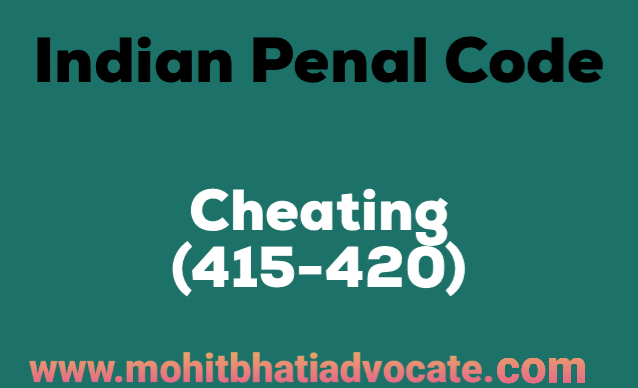Whoever, by deceiving any person, fraudulently or dishonestly induces the person so deceived to deliver any property to any person, or to consent that any person shall retain any property, or intentionally induces the person so deceived to do or omit to do anything which he would not do or omit if he were not so deceived, and which act or omission causes or is likely to cause damage or harm to that person in body, mind, reputation or property, is said to “cheat”.
Thus, ingredients of Cheating are –
-
Inducement
-
Dishonest or Fraudulent
-
Inducing that person to
-
Deliver any property to any person; or
-
Consent that any person shall retain any property, or
-
to do or omit to do anything which he would not do or omit if he were not so deceived
-
-
Act or omission causes or is likely to cause damage or harm to that person in body, mind, reputation, or property.
 |
| Adhivakta Law Cafe |
Illustrations
-
A, by putting a counterfeit mark on an article, intentionally deceives Z into a belief that this article was made by a certain celebrated manufacturer, and thus dishonestly induces Z to buy and pay for the article. A cheats.
-
A, by exhibiting to Z a false sample of an article intentionally deceives Z into believing that the article corresponds with the sample, and thereby dishonestly induces Z to buy and pay for the article. A cheats.
-
A, by pledging as diamond articles which he knows are not diamonds, intentionally deceives Z, and thereby dishonestly induces Z to lend money. A cheats.
-
A Intentionally deceives Z into a belief that A means to repay any money that Z may lend to him and thereby dishonestly induces Z to lend him money, A not intending to repay it. A cheats.
-
A intentionally deceives Z into a belief that A means to deliver to Z a certain quantity of indigo plant which he does not intend to deliver, and thereby dishonestly induces Z to advance money upon the faith of such delivery. A cheats; but if A, at the time of obtaining the money, intends to deliver the indigo plant, and afterwards breaks his contract and does not deliver it, he does not cheat, but is liable only to a civil action for breach of contract.
-
A sells and conveys an estate to B. A, knowing that in consequence of such sale he has no right to the property, sells or mortgages the same to Z, without disclosing the fact of the previous sale and conveyance to B, and receives the purchase or mortgage money from Z. A cheats.
-
A cheats by pretending to be a certain rich banker of the same name. A cheats by personation.
-
A cheats by pretending to be B, a person who is deceased. A cheats by personation.
